Omicron dragging out the pandemic. A mental health crisis. Russia ratting nukes at Ukraine. Biblical floods in Malaysia. An oil spill in Thailand. The culling of Hong Kong’s hamsters. The year 2022 may already be making us feel powerless in the face of so many problems. The climate crisis is gathering momentum and is breaking new records for global temperatures and damages from extreme weather. To tackle it requires bold structural changes. But individual action does matter. As Greta Thunberg pointed out, “I know we need a system change rather than individual change. But you can not have one without the other.”
To continue reading, subscribe to Eco‑Business.
There's something for everyone. We offer a range of subscription plans.
- Access our stories and receive our Insights Weekly newsletter with the free EB Member plan.
- Unlock unlimited access to our content and archive with EB Circle.
- Publish your content with EB Premium.
Here, Eco-Business suggests 22 ways you can live your best life in 2022.
1. First, fix yourself
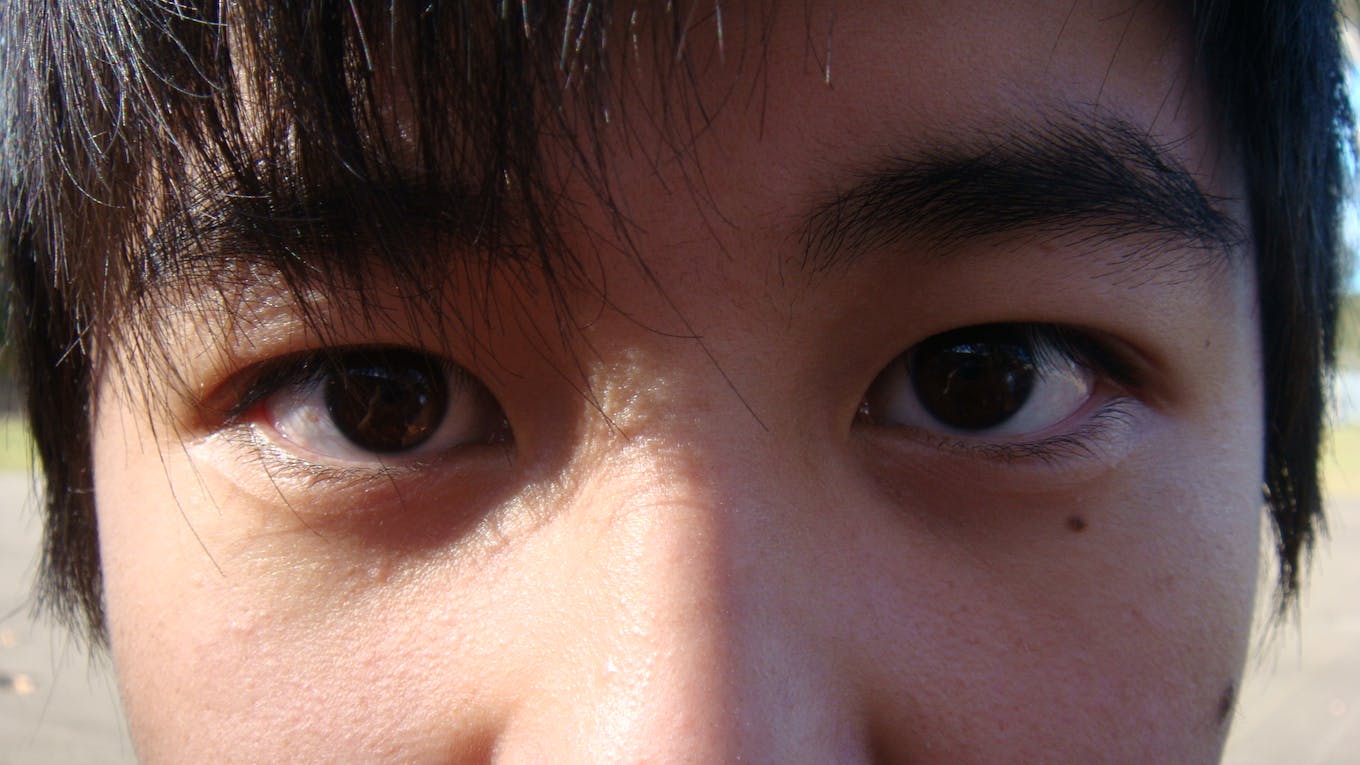
Reminding yourself every day of things you’re grateful for is scientifically proven to stave off depression. Image: Flickr
Before you set out to save the world, start with yourself. The most effective thing you could do this year to improve your mental health is to think about things to be grateful for, suggests Sydney-based clinical psychologist Esther Long. If you count your blessings every day for six weeks, your brain chemistry will actually change. Grateful people tend to be less depressed. Kindness is a powerful antidepressant too. “Doing something nice for someone every day boosts your sense of wellbeing,” says Long. Working rituals into your day helps too. Meditate, even if you think you don’t have time. Exercise, every day. Do things you enjoy, every day. Keep in touch with the people you love regularly. Smile at people you don’t like. If you can laugh when the chips are down, as comedian Ricky Gervais says, you’re bulletproof.
2. Think before you have children

The most impactful thing you can do to keep your carbon footprint in check this year is to not have children. Image: Flickr
This is the most controversial point. The most impactful thing you can do to keep your carbon footprint in check this year — or indeed in any year of your life — is to not have children. Or rather fewer children. Although the population is projected to almost stop growing by the end of the century, there are still too many people for the planet to sustain the current rate of resource consumption. While this may be true, and a point that environmental economist Paul Hawken makes in his book Drawdown: The Most Comprehensive Plan Ever Proposed to Reverse Global Warming, under chapters on family planning and educating girls, it is hard to advocate for childlessness without coming across as a human rights-trampling population control tsar. As Dan Wells, a London-based sustainable finance professional who has three children, says, to not believe in children is to not believe in the future, and the ability of young people to help fix the world’s problems. But, he adds, “if you have kids, you have a massive responsibility to educate them, and raise advocates for climate action. Well educated kids can become carbon negative adults, by helping to solve the decarbonisation riddle.”
3. Invest in legitimate green funds
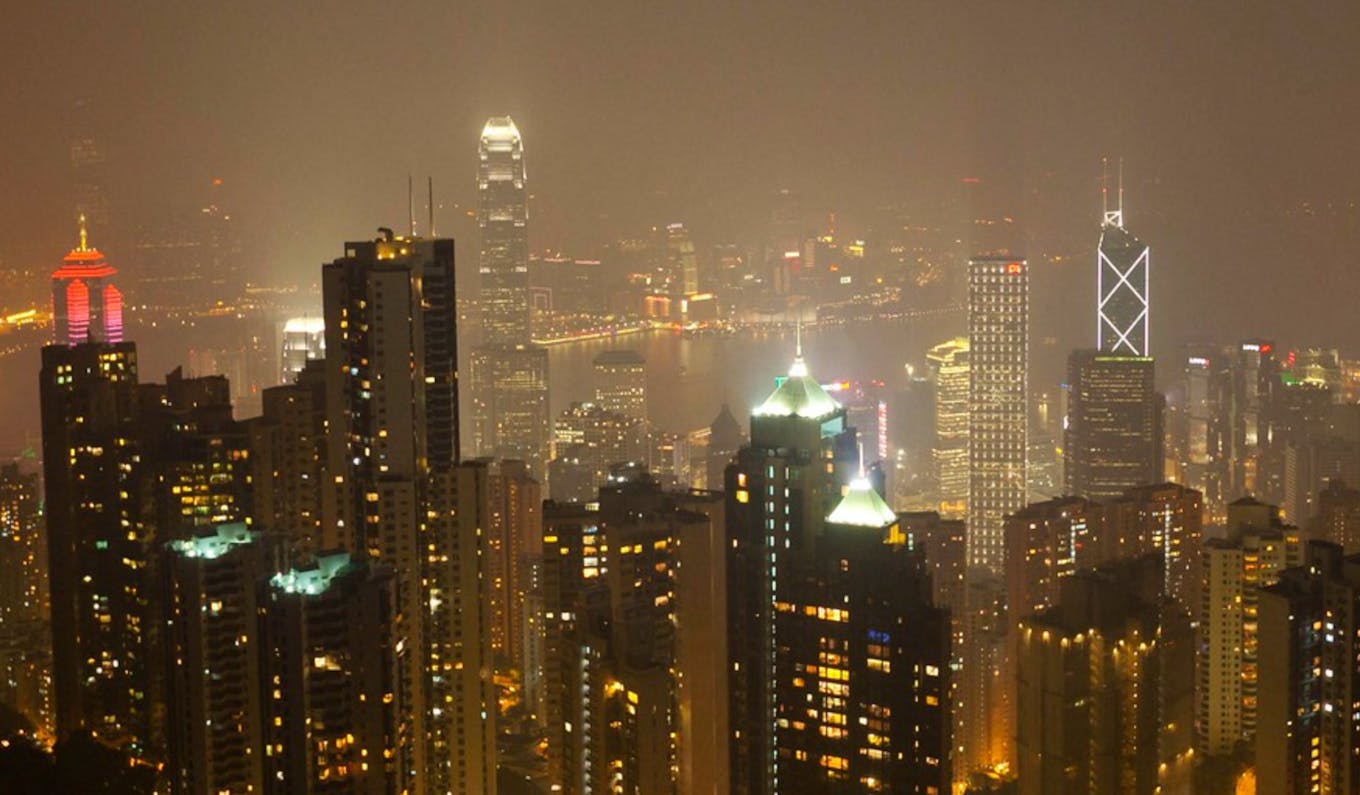
How green are your green investments, really? Image: dorinser/Flickr
A quick glance at the companies listed under a “sustainable” fund should be enough to convince anyone that investing your money to do good in the public equity markets doesn’t do what it is supposed to. “Most are tech companies, like Google or Microsoft,” notes Rousseau Anai, former Asia Pacific head of investment firm Cantor Fitzgerald. “Theoretically, ESG investing is a sound idea, but in practice it doesn’t really work,” he says. “Truly sustainable companies just aren’t going to deliver outsized returns yet. It’s extremely difficult for sustainable businesses to raise the sort of money on the public markets your average investor is looking for,” he says. Instead, Anai recommends investing directly in genuinely green firms. “Find companies that are targeting specific sustainability issues that you believe in. These companies are not necessarily startups. They are companies doing business differently,” he says.
4. Go on a planet-based diet
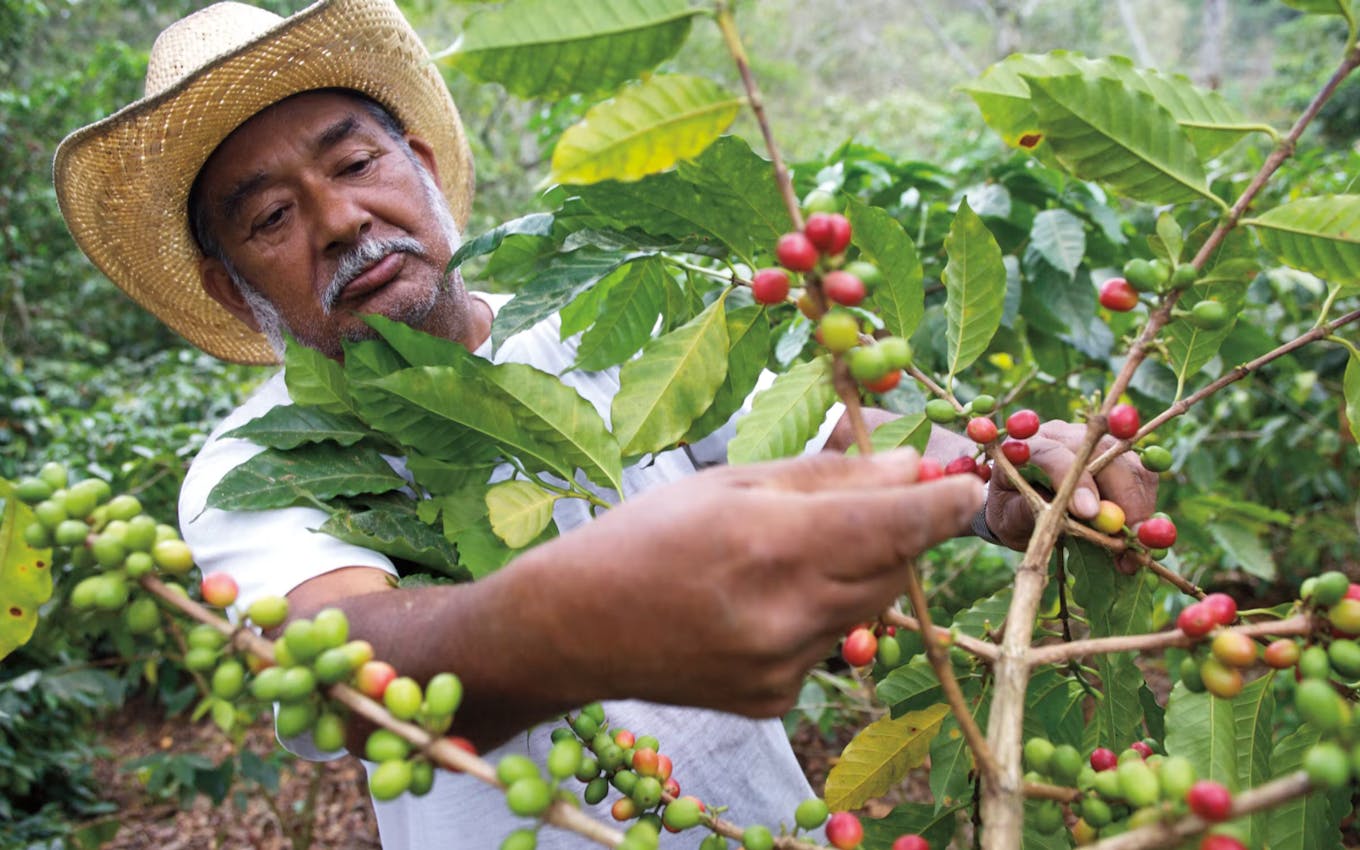
In some countries, coffee has a higher biodiversity footprint than meat. Image: Nestle via Flickr, CC BY-NC-ND 2.0
Eating more veggies and less meat has well-known health and planetary benefits. A plant-based diet can lower rates of obesity, diabetes, and heart disease. It could also reduce annual agricultural production emissions by almost two-thirds, and remove 100 billion tonnes of carbon dioxide from the atmosphere by 2100, if the agricultural land used to rear animals is rewilded, according to a December 2021 paper by Leiden University in the Netherlands.
But the planetary benefits of switching to greens are not black and white. According to the World Wide Fund for Nature’s (WWF) diet analysis tool Planet-based diets, which calculates the environmental impact of diets in different countries, the eco-friendliness of your diet depends entirely on local context. If you live in Denmark, the biggest impact on biodiversity loss does not come from consuming red meat and dairy, but coffee, tea, spices and cocoa — because of the impact of growing these commodities on tropical forests. If you live in land-scarce Singapore, which relies on food imports, it’s always best to eat local.
Changing your diet should be done fully aware of the source of your food, says Brent Loken, WWF’s Stockholm-based global food lead scientist, who has a mainly plant-based diet, but eats chicken or fish once a week. “Flexibility is the most important thing,” he says. Also, don’t think that plant-based fast food is any better than meat-based junk food. “Plant-based burgers may be better for the planet, but are they good for ourselves? Raw, natural foods are always the best, as you really know what you’re eating,” says Loken.
5. Change your carnivorous pet’s diet. Or change your pet
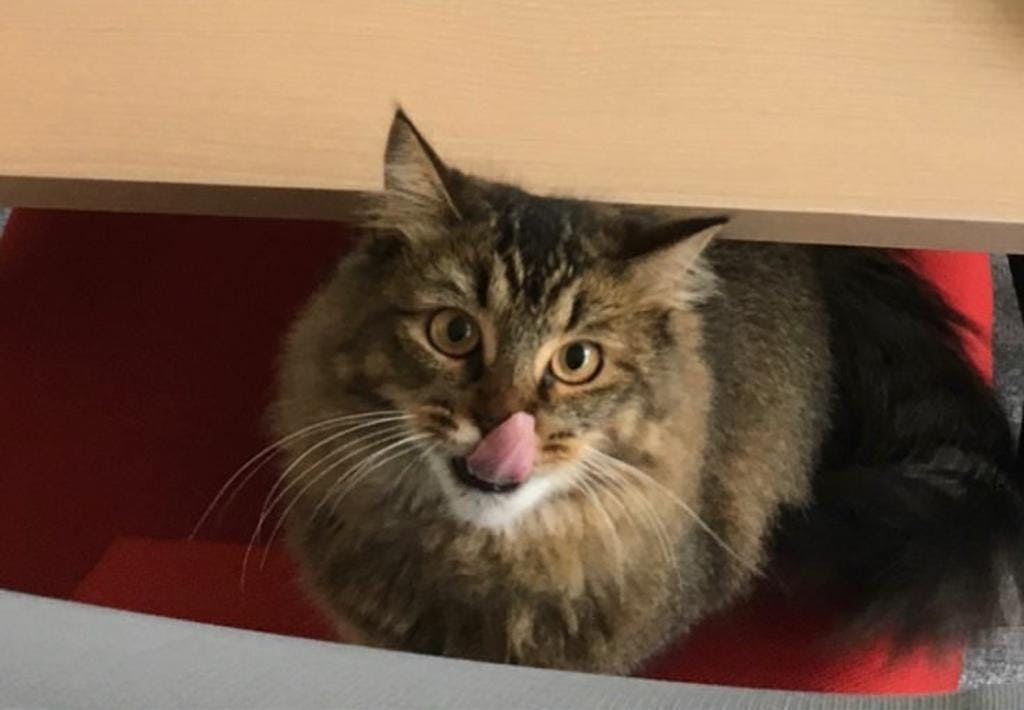
Pets eat one-fifth of the world’s meat and fish. Image: Robin Hicks/Eco-Business, courtesy of Michelle Goh and her cat, Monkey
As good for our mental health as pets are, our furry friends add substantially to our carbon footprint. What the estimated 471 million dogs and 373 million cats living among us eat generates the same carbon emissions as driving 13.6 million cars for a year. Pets eat one-fifth of the world’s meat and fish, and an area twice the size of the United Kingdom is used to make dry pet food every year. To put a leash on this carbon cost, check with a vet how many calories they actually need according to their size and physical activity. Don’t feed them beef. Try insect-based food instead. And don’t feed them fancy, human-grade meat that requires more animals to be raised. Food that contains meat scraps is nutritionally fine for pets, and cuts down on food waste, as it uses animal parts that humans don’t eat. Also, why not choose a lower-carbon, herbivorous pet, like a chicken or a goat, instead of a cat or dog?
6. Stop buying new stuff. Repair it
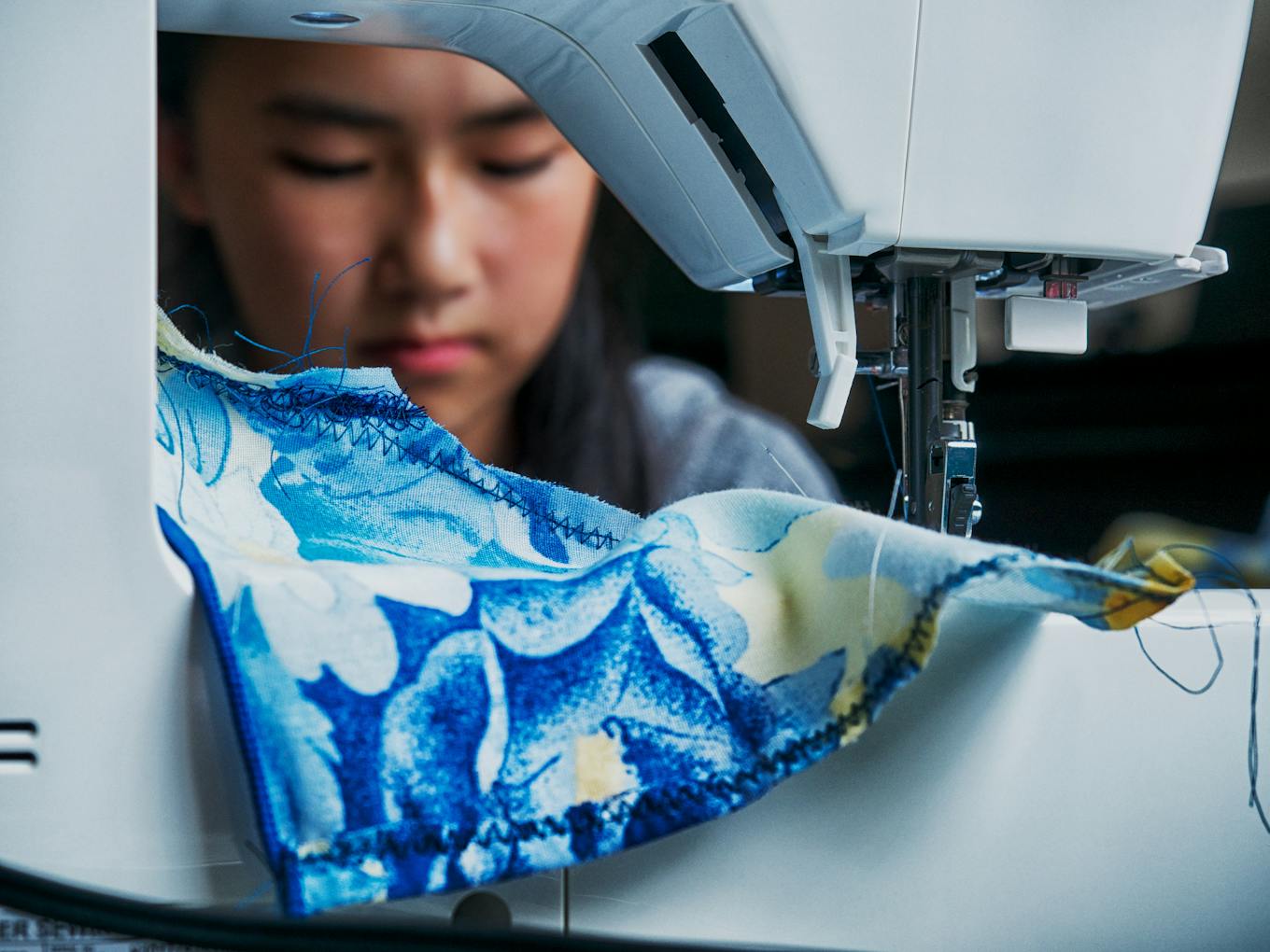
Learn how to sew. Borrow a sewing machine. If you do buy new items, clothes swap and buy second hand. Image: Gene McDaniel/Flickr
One of the worst sins of capitalism is companies designing products to fail before they should, just so they can make more money. Like Apple, which was hit with yet another lawsuit last year, when a Portuguese consumer rights group sued the consumer electronics giant for forcing users to replace the battery of their iPhones or buy a new one. Don’t play their game. Get stuff repaired. Right to repair laws will soon force companies to make products easier to repair, and Apple has responded by rolling out its Self Service Repair programme around the world this year. Or switch to brands that are more easily repairable by design, like the modular Fairphone.
And stop buying new clothes if there is a tear that can be fixed. Learn how to sew. Borrow a sewing machine. If you do buy new items, clothes swap and buy second hand. Or buy clothes made from organic hemp, bamboo or recycled materials. Then wear them for so long they come into fashion again a few decades later. Never buy tools. Seriously, how often do you use a power drill? Use a tool library instead.
7. Work from home. Most of the time
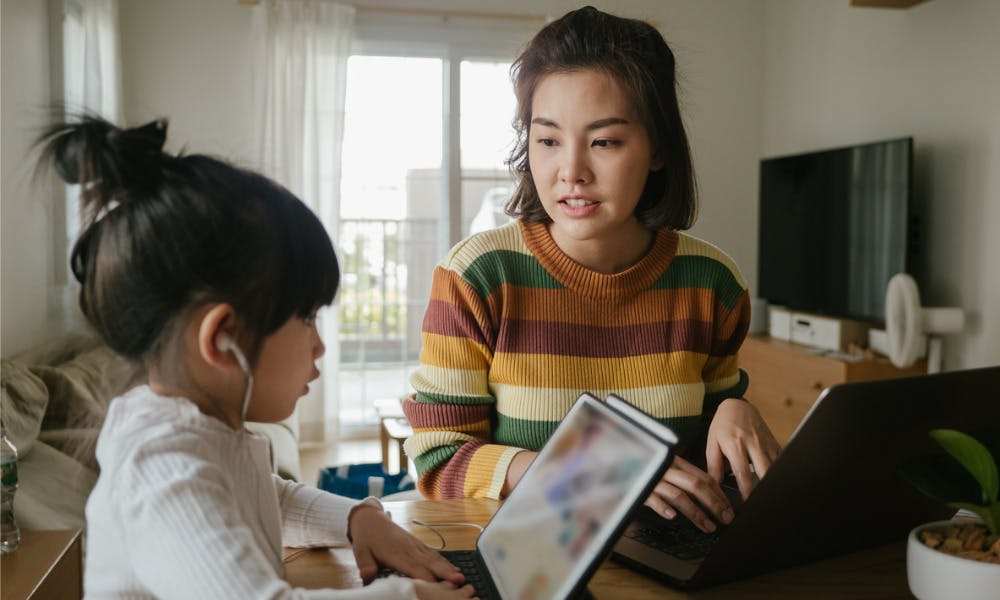
Working from home lowers your environmental footprint, but may come at a cost to your relationships with colleagues. Image: HCAmag.com
Your boss may want to have you back in the office as soon as the Covid-19 rules permit, so they can physically watch you working. But studies have shown that only one in 10 people want to return to the office five days a week, and many have said they’ll quit if forced back full-time.
There are good reasons for not rushing back to the office, besides avoiding what a McKinsey study found to be higher stress levels among those who have already returned. The first is that people are generally more productive working from home, despite the distractions of children, daytime television and cats. Not commuting reduces your personal emissions, and saves on other costs of office life, like paper, plastic and air-conditioning. A recent study by researchers in Lithuania, Cyprus and Germany found that at least four litres of transportation fuel and 7.4 kg of carbon dioxide can be saved per hour of remote work per 100 employees.
Remote work also gives you more opportunities to become a bigger part of your local community, and economy. But it can also come with a cost to the real relationships you have at work. Zoom is no substitute to the office water-cooler for social interaction, spontaneous conversations, and setting the ever-blurrier boundaries between home and work. So while returning to the office full-time may fill many office workers with dread, the best solution is a hybrid working week, combining the best of both worlds.
8. If you can walk, don’t shop online
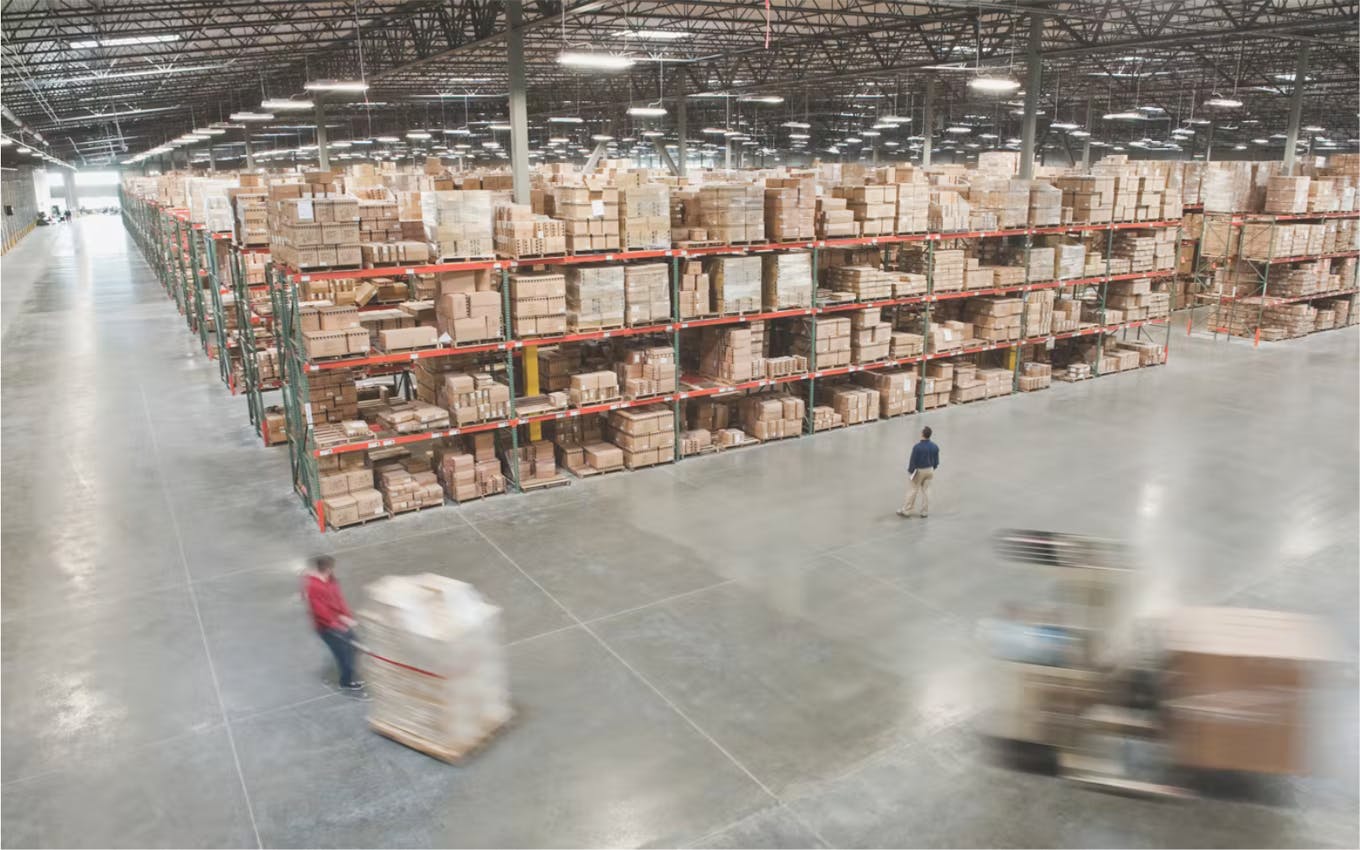
E-commerce is contributing to a surge in packaging waste. How hard is it to walk to the shops? Image: Sealed Air
There is something suspiciously convenient about a package arriving on your doorstep a few hours after you ordered it, shipped for free and entombed in plastic. Unless you are physically unable, or an item is not for sale anywhere locally, walk, jog or cycle to the shops.
E-commerce companies now talk a much better sustainability game than they did five years ago. Although most still promote shop-till-you-drop capitalism, behind the scenes the key players have been working to tackle issues such as poor working conditions in warehouses, and unsustainable volumes of disposable packaging that choke landfills. There’s also research that shows that, if logistics are well managed and multiple orders are consolidated into single deliveries, the emissions of e-commerce can be a lot lower than driving to a supermarket or mall. But even so, e-commerce supercharges the worst excesses of capitalism. Fuelled by the pandemic, e-commerce growth has been exponential, and online shopping addiction is a growing problem, particularly since consumers can return unwanted items at little or no cost, sometimes to the detriment of the original seller. While consumers may be screaming for ever-faster, cheaper ways to shop, don’t be one of them — get off your bum and walk to the shops. Who knows, you might bump into the love of your life in the discounts aisle.
9. Stay where you are. If you do travel, don’t fly

Travelling by train uses about a sixth of the carbon of air travel. Image: Robin Hicks/Eco-Business
Covid has scuppered most people’s travel plans for the year. But when — or rather if — things return to normal this year, do you really need to escape at the first possible opportunity? Choose a local staycation rather than going abroad. Or if you travel, go somewhere nearby that doesn’t require air travel — take a train or bus instead. Not only is air travel a lot of hassle at the moment, with endless paperwork, virus tests and quarantine ruining the experience. But aviation is a serious climate irritant. A return flight from London to Singapore produces more carbon than the average person in 96 developing countries generates in a year (calculate the carbon footprint of your flight here). Greener aviation fuels such as cooking oil and household waste mixed with kerosene — which can reduce the footprint of a flight by about 80 per cent — are not widely in use yet. Also, sell your car. Join a car club instead, and use an electric one.
10. Don’t wishcycle, freecycle
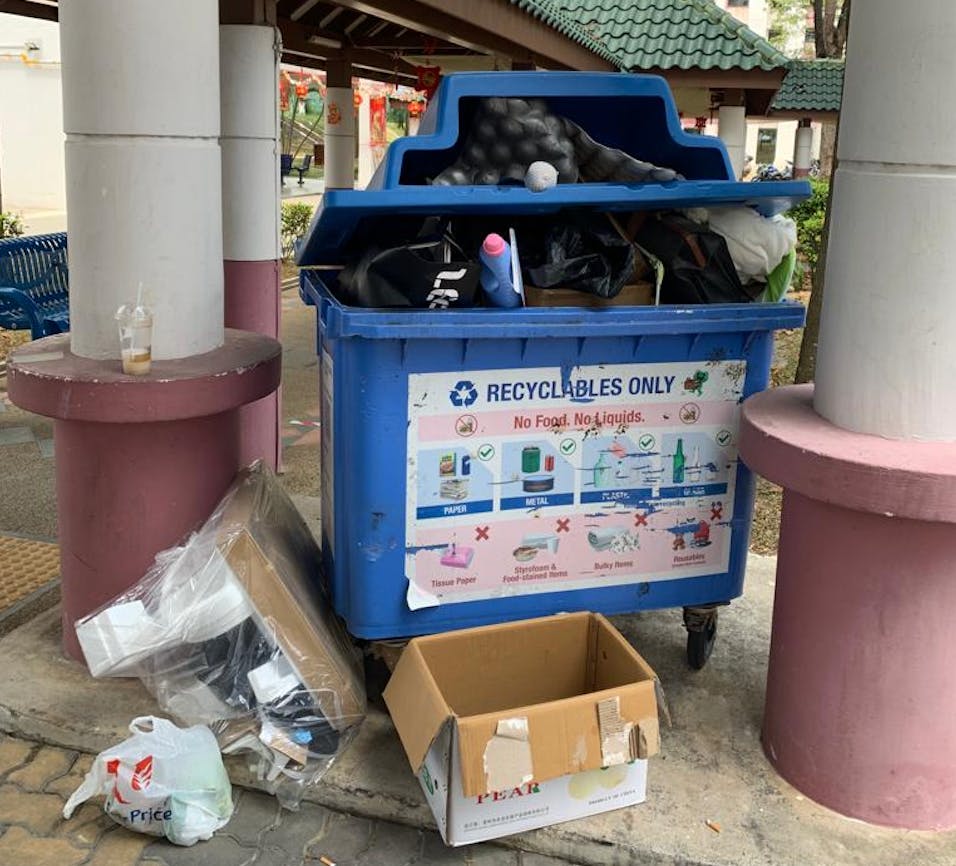
How much of the recycling you deposit in a recycling bin will actually get recycled? In Singapore, about 40 per cent of recyclables are contaminated by wet waste, so cannot be recycled. Image: Robin Hicks/Eco-Business
Rather than trash your unwanted stuff, or gamble on it being recycled by chucking it in a recycling bin (“wishcycling”), give it a second life by freecycling it. Remember, reuse beats recycling every time. Non-profits like freecycle.org, which has amassed around 9.5 million members globally since launching in 2003, and Freegle, self-described as “like online dating for stuff”, enable people to give used goods or materials away for free. Some have voiced concerns that people value stuff less when they haven’t paid for it, and consume used items with even more abandon than new things. But there is a good proportion of folk who value it even more because it is pre-loved and has a story behind it, as well as the environmental benefit of keeping things out of landfill.
11. Dumpster dive
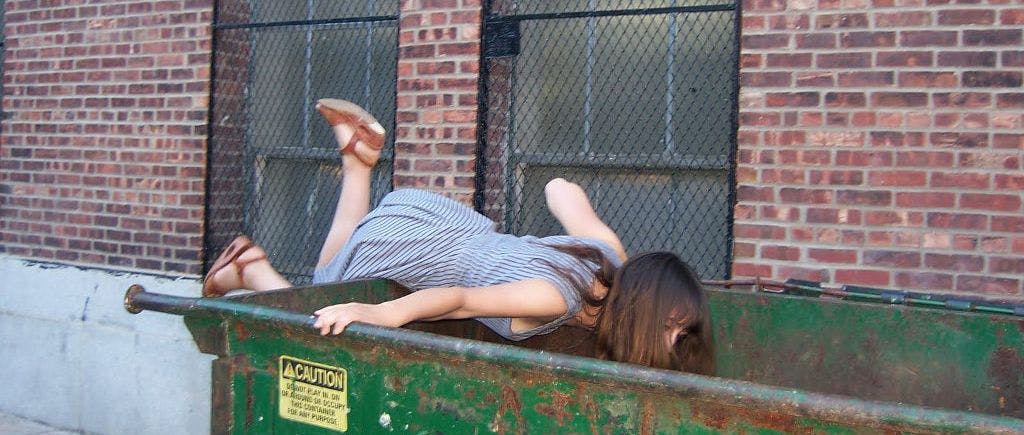
This dumpster diver scores 4/10 for approach, take-off, flight and entry, but 10 out of 10 for environmental impact. Image: shannonmckeogh.com
One person’s trash is another’s treasure… Daniel Tay, a 40 year-old Singaporean financial planner who suffers from depression, claims that anyone could retire at the age of 35 if they dumpster dive—that is, salvage wasted food and other discarded items from dumpsters. Matt Malone, a 41 year-old founder of an Austin, Texas-based security startup, claims he makes more from dumpster diving than from his six-figure salary day job. Dumpster diving is not only potentially lucrative, it turns the wheels of the circular economy, helping to avert tonnes of dumped stuff otherwise destined for landfill or the incinerator. Be careful though. While it may seem like a person has forfeited their ownership rights to items they’ve thrown away, dumpster diving is illegal in many countries, including New Zealand, Germany and Singapore, where trash is technically the rightful property of the local council.
12. Delete a social media app (or all of them)

FOMO will become JOMO after deleting a few social media apps. Image: Happiful
No one ever feels better about life after spending hours doom-scrolling on Twitter. Or Facebook. Or Instagram. Our brains become numbed by overstimulation, and depressed by the constant comparisons with the seemingly perfect lives of others. So press the little red ‘x’ on the jiggling apps on your phone and delete away. FOMO [fear of missing out] will soon become JOMO [joy of missing out]. Do something better with your time. Like journaling, processing your emotions and actually talking to people.
13. Don’t stop watching, reading, and listening…

Rachel Carson, a renowned nature author and a former marine biologist with the United States Fish and Wildlife Service, wrote the seminal Silent Spring. Image: NRDC.org
Gorging on good content on what’s happening to the world is one way to stay sane as the planet slowly fizzles. The “Heading for extinction” talk by Dr Gail Bradbrook of activist group Extinction Rebellion is a bucket of cold water to the face of anyone sitting too comfortably as we hurtle towards climate calamity, explaining the science behind the ecological apocalypse.
The podcast “Is your carbon footprint BS?” may make you feel less guilty about your own environmental impact. It challenges the idea of a personal carbon footprint sold to us by governments and businesses, and reminds us of the need for systemic change above individual action. For some useful guidance on what you can do as an individual, listen to environmental economist Paul Hawken on the Rich Roll Podcast talk about Ending The Climate Crisis In One Generation.
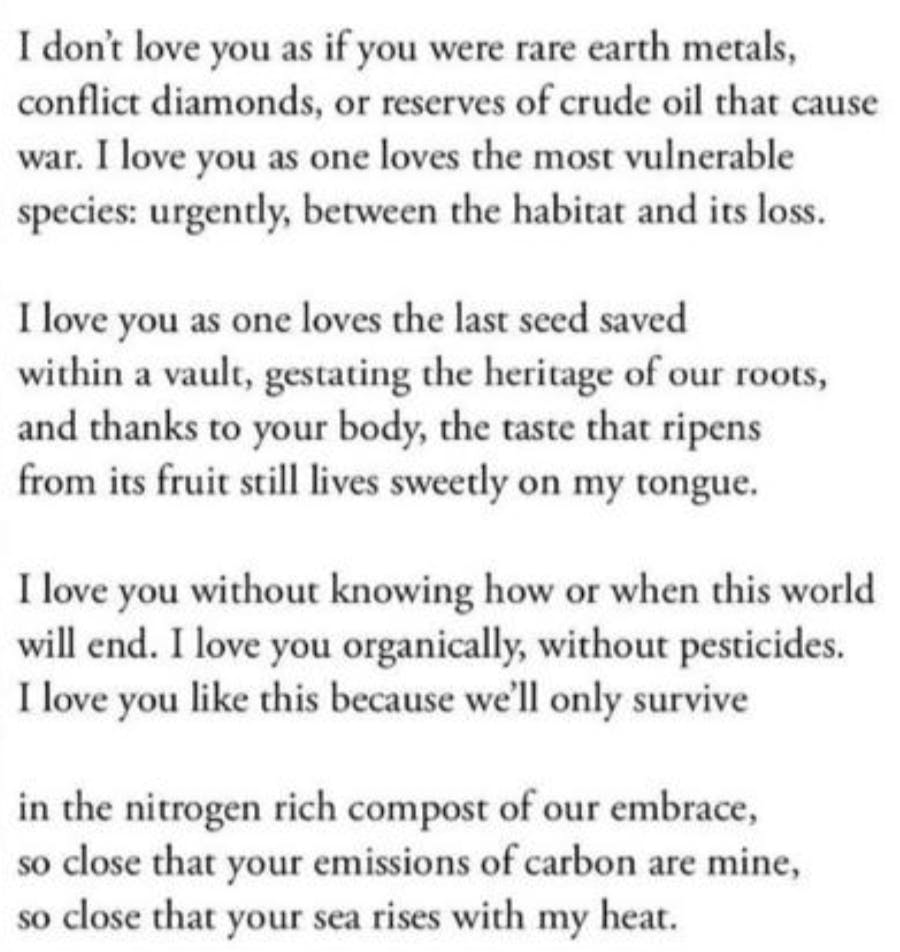
Love in the time of climate change by Craig Santos Perez, an indigenous Chamoru from the Pacific Island of Guam
A must-read for anyone who cares about the planet is the 1960’s book Silent Spring by Rachel Carson. Documenting the harms of chemical pesticides, Carson argues that hubris and financial self-interest are at the root of environmental meltdown and wonders if humanity can exist as an equal to the earth’s systems, rather than a master of them. To help ensure that your children grow into carbon-negative adults, the UK’s BookTrust offers recommended reading lists of environmental stories for children of all ages.
A provocative documentary that questions the integrity of the renewables revolution (no, not Michael Moore’s error-strewn Planet of the humans, which has been dumped on by climate scientists and removed from YouTube) is Headwind 21, the story of a former financier of clean energy projects who migrates to Sweden to retreat into nature and start an eco-farm — only to find a wind park being built on top of a lush forest Eden.
For regular sustainability coverage, as well as subscribing to Eco-Business’s free weekly newsletter (if you don’t already), The Economist — which not too long ago was indifferent to climate change — is well worth the US$378 annual subscription fee. Its Climate Issue is a must-read.
If you need an environmentally-themed song to keep you going, Cat Stevens’ “Where do the children play?”, Neil Young’s “After the gold rush” and — if we had to pick a favourite — “Hymn of the big wheel” by Massive Attack, will get you in the mood. And a poem that reminds us of the need of optimism in confronting the climate crisis is the beautiful On the pulse of morning by Maya Angelou.
14. Stop watching (so much) porn
Porn is blamed for a range of societal harms, from promoting sexual aggression to objectifying women. Image: eyerys.com
How much pornography do you watch, and what sort? Conservative critics of racy content charge that it turns men into sexual predators and that the internet is awash with the stuff. Statistics from Covenant Eyes contend that about a third of all internet traffic is porn, 90 per cent of boys and 60 per cent of girls are exposed to it by the age of consent, and more than half of divorces in the United States involve one spouse becoming obsessed with smut. While more credible research suggests that between 4 and 10 per cent of online content is porn, it’s still a lot. The environmental footprint of PornHub, the internet’s most popular site, was 5.967 million kWh in 2016, equivalent to 11,000 light bulbs left on for a year. And while the societal harm that porn is blamed for — from promoting sexual aggression and corrupting children, to wrecking relationships and objectifying women — is disputed, it may do you some good to cut down, cut it out, or change what you watch. It is fairly obvious that the porn industry is driven, funded, managed and directed by men, and porn site algorithms lure viewers to more extreme content. So why not have sex with your partner instead? Or try more wholesome erotica, like Make love, not porn, a user-generated, “real world” sex platform, which was founded by a mature woman concerned that hardcore porn had become de facto sex education for the young men she was sleeping with.
15. Do dry January (and February, and March…)

Alcohol is not only unhealthy, slowing eating away at our livers. It’s not great for the environment either. Image: Greatist.com
People who drink too much get pulled in two different emotional directions — they get feelings of being intimately connected with the people around them, but also feelings of shame that can turn those relationships toxic. It’s a conflict of interest that gets harder to resolve the more we drink, and social problems can soon bubble up. Booze is not only unhealthy, slowing eating away at our livers. It’s not great for the environment either — from the water, pesticides, and carbon generated from production, to the packaging and unrecycled aluminium cans and glass that end up in landfills. Though this may be hard to swallow after a long week, not drinking is better than drinking for many other reasons. You make better decisions sober. You sleep better. You have more energy. You save money. And you can remember who you slept with last night.
16. Grow your own
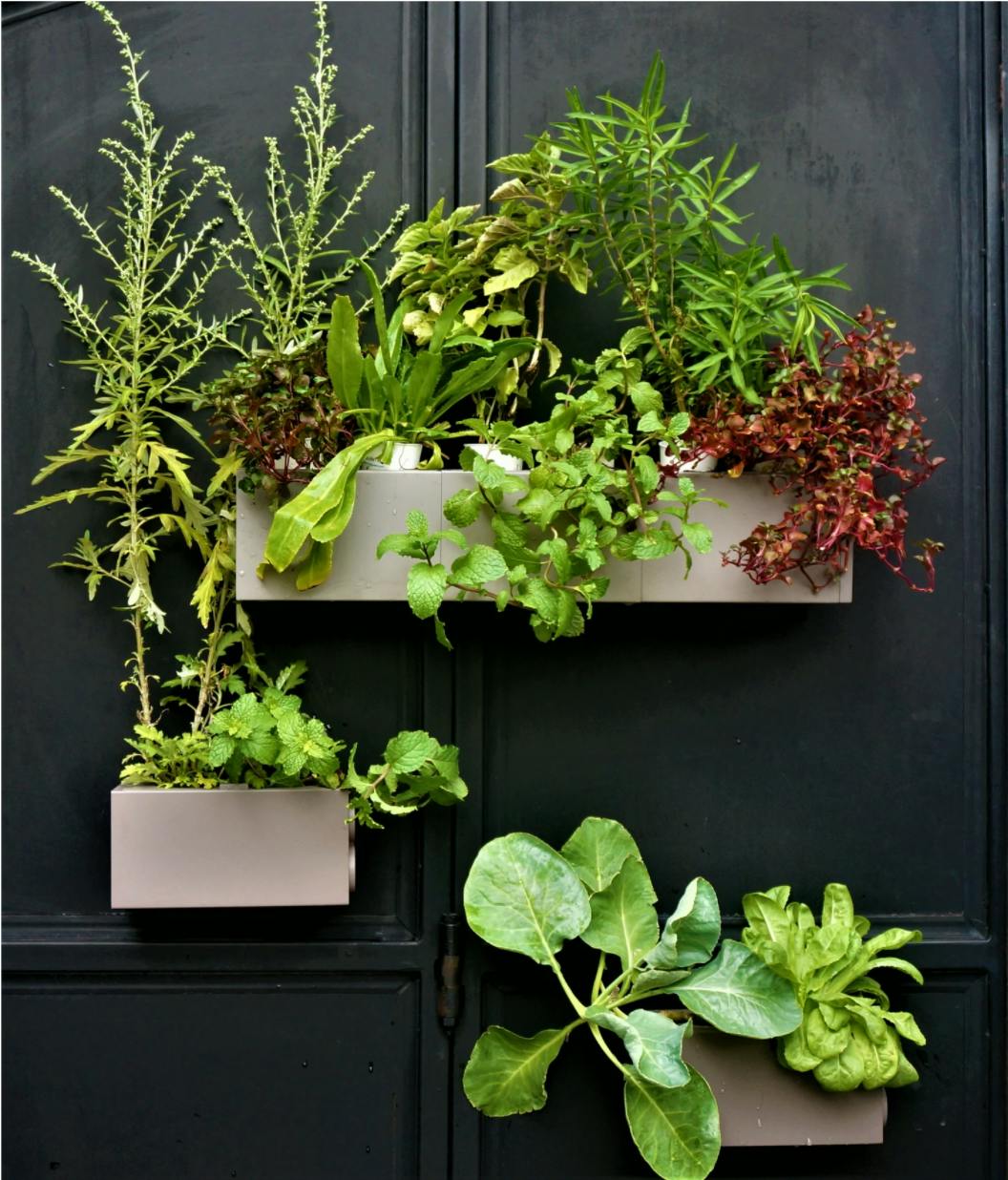
Growing your own food is difficult in some urban environments. Image: One Kind Block
Growing your own food is not only hugely satisfying and much healthier and more sustainable than buying stuff at the supermarket, which is covered with pesticides and relies on a supply chain powered by fossil fuels and reliant on an underpaid labour force toiling in a field somewhere. It also prepares you for when climate change starts wreaking havoc with global harvests, food prices skyrocket and all that’s left to eat is what you can grow yourself. If you live in a high-rise apartment block and are squeezed for space, try growing your veg using One Kind Block, a modular Lego-like hydroponic system, designed by Singaporean teenage entrepreneur Dylan Soh. Use waste food scraps as compost. Start a wormery to process your compost. Worms love to eat your waste food.
17. Stop manicuring your garden
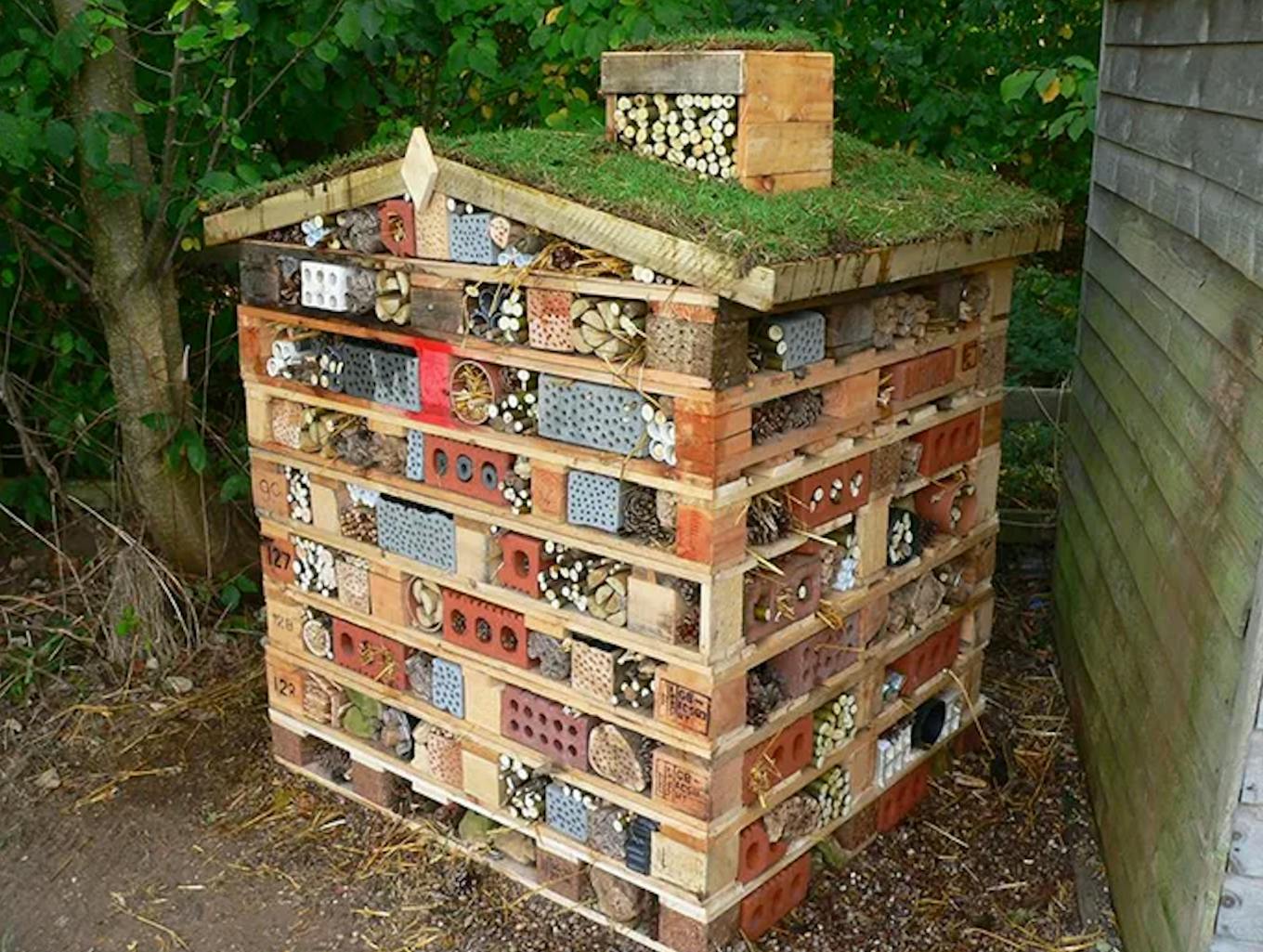
A bee hotel provides refuge for one of the world’s most important creatures. Image: Green Spaces
If you’re lucky enough to have any sort of garden, resist the temptation to prune and let some of it grow. Make your patch of green a safe haven for nature by letting the grass grow. Plant creepers, which make excellent shelter for birds, insects, lizards and snakes. Build a bird box. Build a bee hotel. Bees are one of the most important living things, but the over-use of pesticides and weed killers is endangering many species. A bee hotel made out of layers of upcycled old pallets and bricks will provide them, and other pollinators, with crevices to hide in. After a few months, sit back, relax, and soak in the wildlife-friendly Eden in your backyard.
18. Regift

Recycle your unwanted presents by giving them to someone else. Image: entrepreneur.com
The idea of regifting popped up on an episode of American sitcom Seinfeld in 1995: unwanted presents repackaged and given to someone else. The idea is less likely to be seen as cheap these days, as people wake up to the horrors of overflowing landfills and carcinogen-spewing trash incinerators. But when you regift, it’s probably best to avoid giving dodgy presents no-one will want, like a branded freebie you received at an awards dinner. And try to remember to remove personal notes written on the item before you regift it.
19. Be a practivist
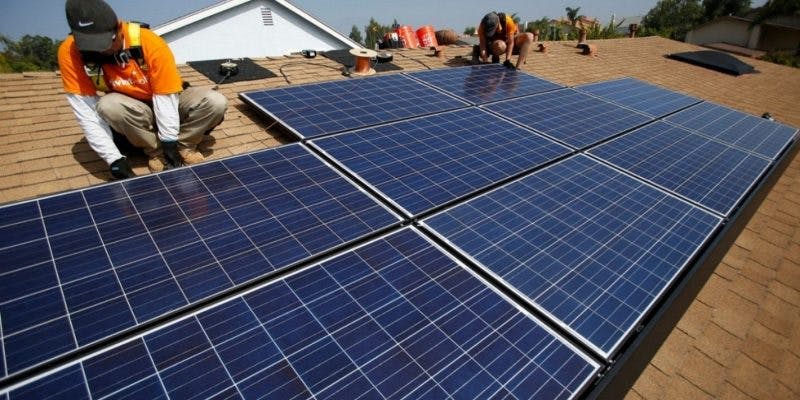
Rather than take to the streets, why not do something practical, like learn how to be an electrical engineer and fit solar panels to your home. Image: electricalswitchboards.com.au
You don’t need to chain yourself to a tree or lie in front of a coal train to be an environmental activist, just as you don’t need to be a keyboard warrior to fight injustice online. But in countries like Singapore, where you can get arrested for holding a piece of cardboard outside a train station, or the Philippines, where you could get murdered for protesting against a coal mine, it maybe better to choose practivism over traditional forms of activism. The practivist is an activist who stands up for what they believe in through their daily lifestyle choices and buying decisions. The practivist thinks carefully about the lifecyle of what they buy. Is plastic always the worst packaging option? Single-use anything is bad. Aluminium, though highly recyclable, uses a tremendous amount of energy to manufacture. Glass is heavy, so has a high emissions footprint to transport. A practivist is also someone who re-skills or upskills to make themselves a useful ally in the climate fight, like learning to be an electrical engineer to put solar panels on your roof.
20. Volunteer
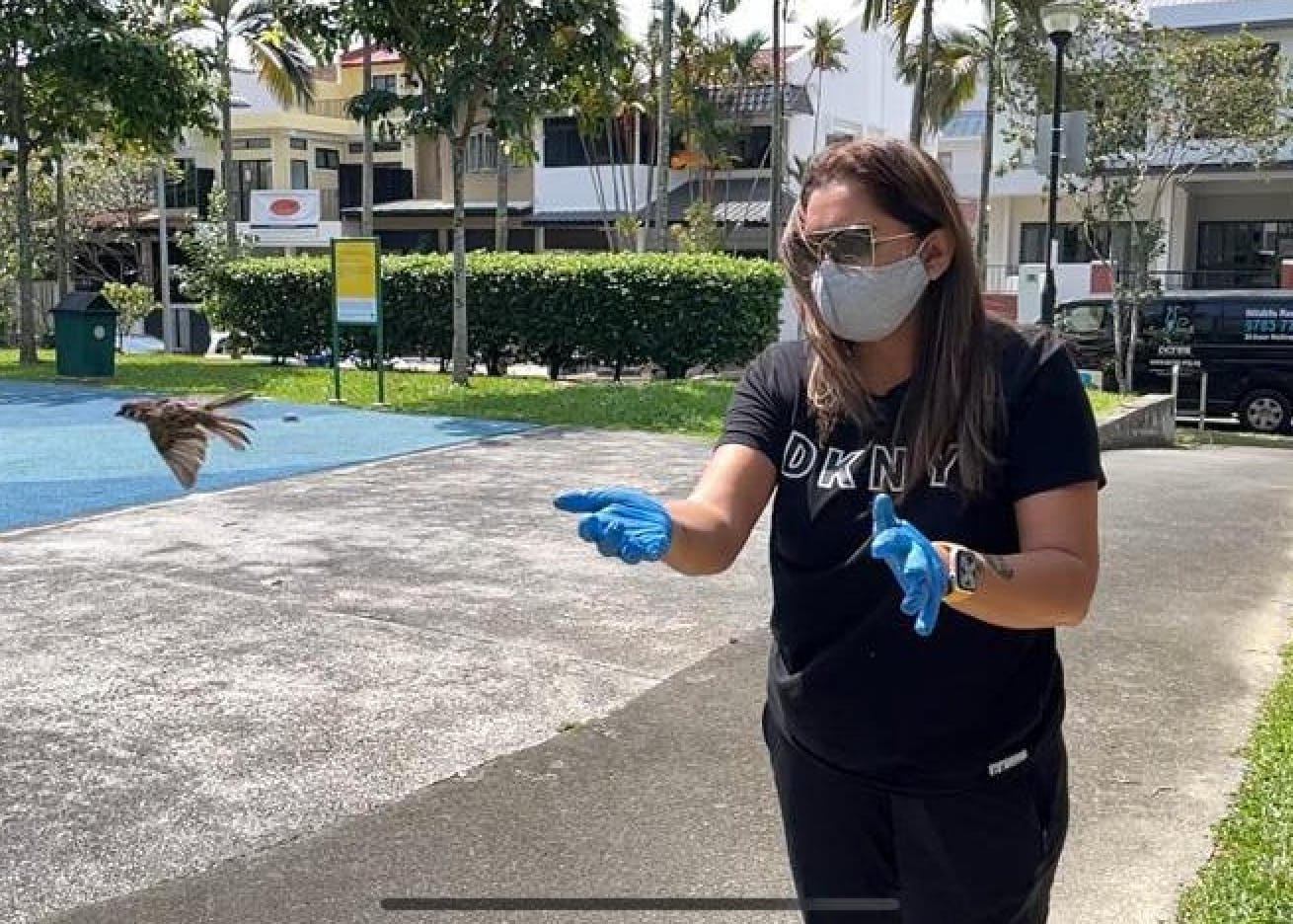
Chetna Atin, a volunteer for animal welfare charity Animal Concerns, Research and Education Society (ACRES), releases a European tree sparrow. Image: ACRES
Giving back, gives back. Volunteering increases self-confidence, boosts self-esteem, gives a sense of purpose, improves interpersonal skills, and shines on your CV. Also, the civic society space in Asia is shrinking — and needs you. Newly passed laws such as the Foreign Interference Countermeasures Act (FICA) in Singapore and Foreign Contribution Regulation Act (FCRA) in India make life much harder for non-government organisations to do their good work. Find one that fits your personal interests — like Singapore animal welfare group ACRES, gender equality charity AWARE, or sex workers protection non-profit Project X — and throw yourself into it. You will be rewarded, and so will society.
21. Call out greenwash
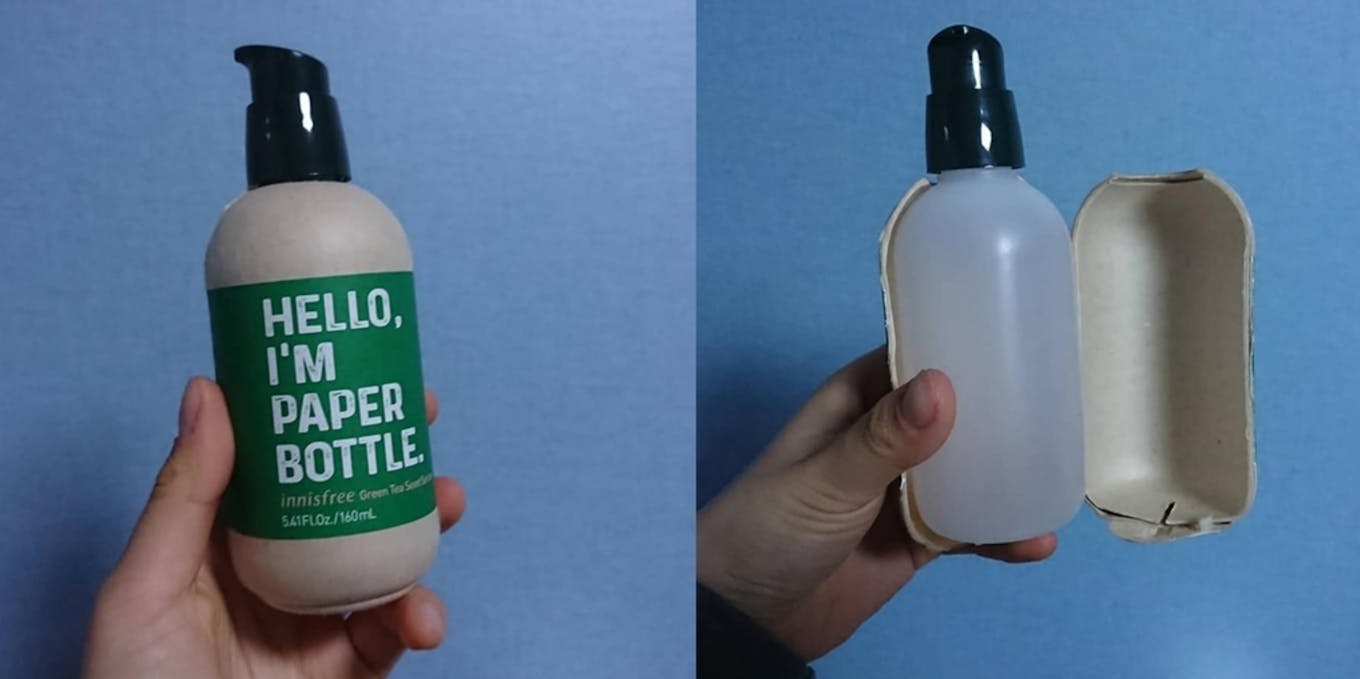
Brands need to held account for greenwash — dubious claims about their sustainability credentials. Image: No Plastic Shopping
Trying to live a better life will mean you’re confronted with a lot of bluster from brands showing off about how sustainable they are. Don’t believe a word of it. Can a bank really claim to be on the road to net-zero while still financing gas fields? Can there really be such a thing as carbon-neutral oil? Companies need to be challenged on what they’re telling consumers. Exposing their hypocrisy pushes them to work on areas where they need to improve. Here are some tips for how to spot greenwash:
- Is the company’s head of sustainability also their public relations chief?
- Is the claim the company is making way outside of its area of expertise?
- Is there no credible data to support their claim?
- Has the firm spent heavily on marketing but less obviously on sustainability programmes?
- Is the only time you hear from this company on a sustainability-themed occasion like Earth Day or International Women’s Day?
- Does the company appear to be promoting its sustainability efforts to win an award?
If the answer to any of the above is yes, call it out.
22. Don’t preach
Nobody likes to be lectured. Even if you’re Mr or Mrs Eco, living the perfect carbon-negative life in an offgrid solar-powered bamboo hut on a diet of mung beans and dung beetles; don’t try to force other people to be like you. It doesn’t work. Everyone has a form of inner rebel who wants to do the opposite of what they’re told. This is known as psychological reactance — it’s a natural response to the threat to our freedom of choice. If you want to convert your meat-eating, frequent-flying friend into a mirror image of yourself, give them praise for even the smallest change they make to live more sustainably. You’ll find that they carry on doing that good thing, and, motivated by the Pavlovian reward of praise, seek out other ways to live greener. “Being a lighthouse is good, you’ll inspire people,” says Dan Wells, who’s writing a book about personal sustainability. “But preaching will always backfire.”
Did we miss any? Let us know what they are. Write to news@eco-business.com.


